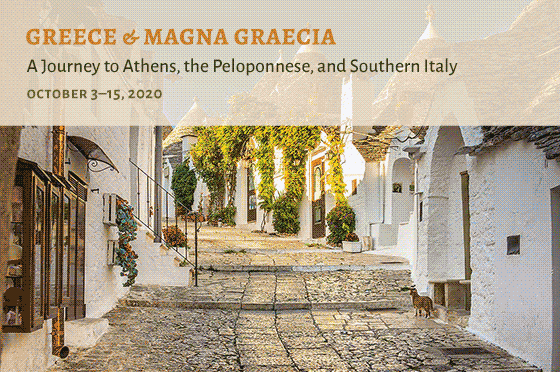SCIENCE SALON # 88
Michael Shermer with Daniel Oberhaus — Extraterrestrial Languages
The endlessly fascinating question of whether we are alone in the universe has always been accompanied by another, more complicated one: if there is extraterrestrial life, how would we communicate with it? In his book Extraterrestrial Languages, Daniel Oberhaus leads readers on a quest for extraterrestrial communication. Exploring Earthlings’ various attempts to reach out to non-Earthlings over the centuries, he poses some not entirely answerable questions. If we send a message into space, will extraterrestrial beings receive it? Will they understand? What languages will they (and we) speak? If we can’t even communicate with dolphins and whales, which are mammals, or chimpanzees and gorillas, which are primates, how are we going to communicate with sentient beings that evolved on another planet? If we want to send a message to far-future humans to, say, warn them not to open a container of radioactive waste from a nuclear plant, what would we put on the container to communicate the danger within? Is there not only a universal grammar (as Noam Chomsky has posited), but also a grammar of the universe?
In this incredibly fascinating conversation Shermer and Oberhaus also discuss:
- the late-19th-century idea to communicate with Martians via Morse code and mirrors
- the emergence in the 20th century of SETI (the search for extraterrestrial intelligence), CETI (communication with extraterrestrial intelligence), and finally METI (messaging extraterrestrial intelligence)
- the one-way space voyage of Ella, an artificial intelligence agent that can play cards, tell fortunes, and recite poetry
- different media used in attempts at extraterrestrial communication, from microwave systems to plaques on spacecrafts to formal logic, and our attempts to formulate a language for our message, including the Astraglossa and two generations of Lincos (lingua cosmica)
- how philosophy, linguistics, mathematics, science, and art have informed the design or limited the effectiveness of our interstellar messaging.
Daniel Oberhaus is a science and technology journalist whose work has appeared in Wired, the Atlantic, Popular Mechanics, Slate, the Baffler, Nautilus, Vice, the Awl, and other publications.
Listen to the podcast via Apple Podcasts, Spotify, Google Podcasts, Stitcher, iHeartRadio, and TuneIn.
Check Us Out On YouTube.
Science Salons • Michael Shermer
Skeptic Presents • All Videos
You play a vital part in our commitment to promote science and reason. If you enjoy the Science Salon Podcast, please show your support by making a donation.
OCTOBER 3–15, 2020
13 days exploring the archeological and cultural riches of Athens, the Peloponnese, and Southern Italy, led by renowned Pulitzer-prize-winning author JARED DIAMOND
Explore ancient sites of Greece and southern Italy in the company of Professor Jared Diamond, the Pulitzer-prize-winning and bestselling author, and a frequent lecturer of our Distinguished Science Lecture Series.
This unique journey explores parts of Greece and Italy that share a common history going back thousands of years. Beginning in Athens, travelers will visit its famed monuments that stand as testimonials to the incredible achievements of the Classical period (5th to 4th centuries BC) when the city reached its Golden Age. The trip then proceeds south to the Peloponnese, separated from the Greek mainland by the narrow sliver of the Corinth Canal.
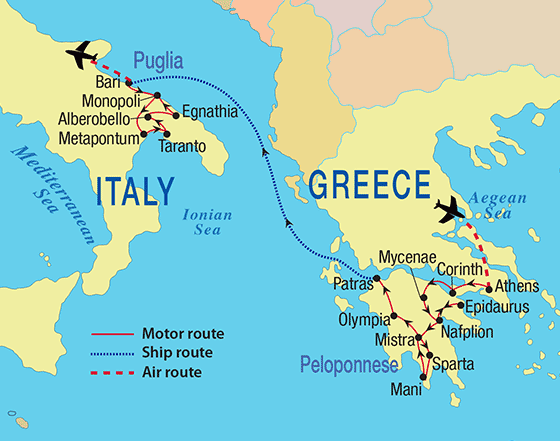
JOURNEY HIGHLIGHTS: • Attend lectures and discussions by Prof. Jared Diamond. • Visit magnificent ancient sites in Athens and the Peloponnese, dating from the Bronze Age to the Byzantine period. • Explore the rarely visited tower villages of Mani. • Cross the Ionian and Adriatic Seas on a modern ferry. • Walk the streets in Puglia’s Alberobello, lined with the conical trulli.
The landmark archaeological sites, historic towns and the beauty of its scenery combine to make the Peloponnese one of Greece’s most important and appealing areas. This was the home of the Mycenaean civilization, fabled Sparta and tranquil Olympia. It was the site of the Olympic Games, which were held every four years, from 776 BC until AD 393, a span of over 1000 years. Here, travelers will explore important sites that span the millennia, from the Bronze Age to the Byzantine period.
The discourse on Greek civilization will continue from the Peloponnese, under sail across the Ionian and Adriatic Seas aboard a modern ferry to southern Italy. After landing in Bari, the tour will spend three days in the heart of Puglia. This region was known in antiquity as Magna Graecia (“Greater Greece”) due to the large number of cities founded by Greeks, starting in the 8th century BC. In all, 22 major settlements were established, some of them evolving into powerful centers of culture and learning. Several will be explored, as well as other attractions of Puglia, including the remarkable trulli villages.
This is a journey to extraordinarily beautiful lands that reveal the continuity of culture from deep antiquity to more recent times. The Skeptics Society is delighted to offer you this opportunity to join Professor Diamond on this magnificent travel and learning experience, whose lectures and discussions will shed light on various aspects of ancient Greek civilization.
For complete details, itinerary, pricing information, and registration forms, please download the following PDFs:

EXPERT GUEST LECTURER
Professor Jared Diamond
Professor Jared Diamond is a Pulitzer-prize-winning author of five best-selling books, translated into 38 languages, about human societies and human evolution: Guns, Germs, and Steel, Collapse, Why Is Sex Fun?, The Third Chimpanzee, and The World Until Yesterday. As a professor of geography at UCLA (University of California at Los Angeles), he is known for his breadth of interests, which involves conducting research and teaching in three other fields: the biology of New Guinea birds, digestive physiology, and conservation biology. His prizes and honors include the U.S. National Medal of Science, the Pulitzer Prize for Non-fiction, the Tyler Prize for Environmental Science, and election to the U.S. National Academy of Sciences. He is a director of World Wildlife Fund/U.S. As a biological explorer, his most widely publicized finding was his rediscovery, at the top of New Guinea’s remote Foja Mountains, of the long-lost Golden-fronted Bowerbird, previously known only from four specimens found in a Paris feather shop in 1895.
Itinerary
DAY 1
Saturday, October 3, 2020
DEPART THE USA
Depart from the USA for Athens, Greece.
DAY 2
Sunday, October 4
ATHENS, Greece
Arrive in Athens and transfer to the deluxe Hotel Grande Bretagne, located on Constitution Square, the center of the city. In the evening, enjoy a welcome dinner. Meals: D
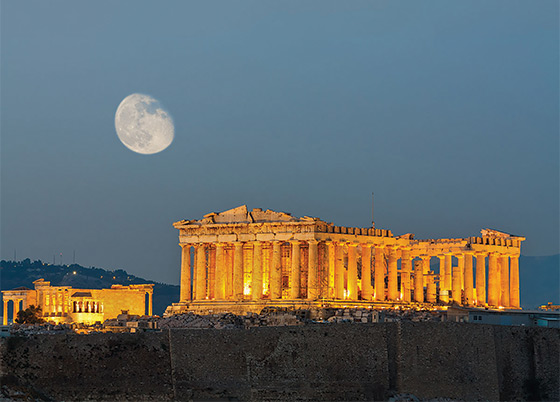
The illuminated Parthenon on the Athenian Acropolis
DAY 3
Monday, October 5
ATHENS
Athens’ ancient monuments attest to its glorious past. This is the birthplace of democracy and many other ideas and concepts that form the integral part of the Western tradition. In the morning explore the Agora, the heart of public life of ancient Athens. Here, Socrates conversed with his fellow citizens. In the afternoon, visit the Acropolis and its celebrated monuments, including the incomparable Parthenon and other temples built in the 5th century BC. Visit also the Acropolis Museum, which houses an outstanding collection of sculptures and other artifacts. Meals: B
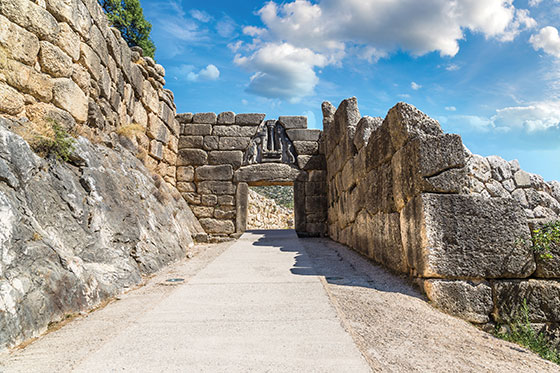
The Lion Gate in Mycenae, Monopoli, Puglia, Italy Peloponnese, Greece
DAY 4
Tuesday, October 6
ATHENS / CORINTH / MYCENAE / NAFPLION
Leaving Athens in the morning, drive over the steep banks of the Corinth Canal, the narrow waterway that separates the Greek mainland from the Peloponnese. Stop at Old Corinth, one of the most prominent and powerful cities of ancient Greece. Visit the 6th-century BC Temple of Apollo, one of the oldest in Greece, and the museum. Continue to Mycenae, the most important center of the Mycenaean civilization that flourished in the second millennium BC, and home of Agamemnon. Walk through the monumental Lion Gate to explore the fabled citadel. End the day in nearby Nafplion at the Hotel Ippoliti. Meals: B, L, D
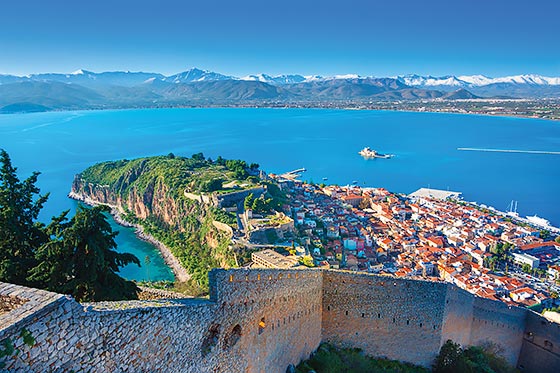
Nafplion, Peloponnese, Greece
DAY 5
Wednesday, October 7
NAFPLION / EPIDAURUS / NAFPLION
Situated on the shores of a spacious bay and crowned with two fortresses, medieval Nafplion is one of Greece’s most attractive towns. Spend the morning at leisure to discover the town’s narrow streets and graceful squares, lined with neoclassical buildings. In the afternoon drive to nearby Epidaurus, the shrine dedicated to Asclepius, the god of healing. A religious shrine, health center and popular spa in antiquity, Epidaurus is famous for its incredible 4th-century BC theater, known for its perfect acoustics and harmonious proportions. Meals: B
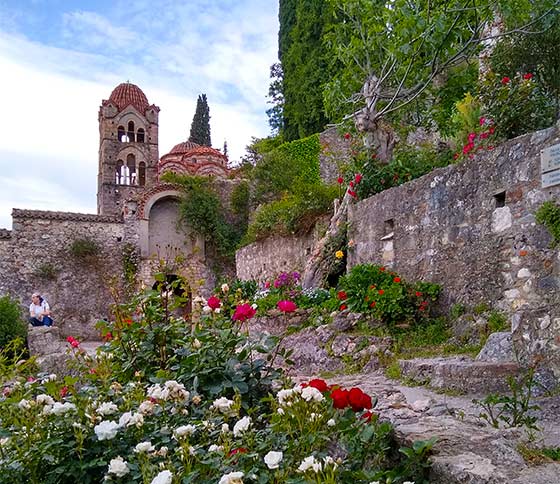
In medieval Mistra, Peloponnese, Greece
DAY 6
Thursday, October 8
NAFPLION / MISTRA / SPARTA
Drive through the heartland of the Peloponnese to Mistra. Built on a conical hill that commands superlative views of the plain of ancient and modern Sparta, Mistra was one of the last flourishing centers of the Byzantine Empire. Today, it is an evocative medieval walled city, with several churches that contain luminous frescoes, palaces and houses from that period. Perhaps no other place in Greece gives travelers such a complete picture of the medieval period as Mistra does, now a UNESCO World Heritage Site. Overnight at the lovely new Mystras Palace Resort and Spa, located in the countryside near Sparta. Meals: B, L, D
DAY 7
Friday, October 9
MISTRA / SPARTA / MANI / MISTRA
Very little remains of ancient Sparta, but the Archaeological Museum, which we will visit in the morning displays artifacts from excavations in Sparta and nearby sites. Continue to storied Mani, which offers some of the most distinctive landscape and architecture in Greece. Visit the caves of Diros, huge chambers with evidence of occupation in the prehistoric period, filled with impressive stalactites and stalagmites. After lunch, explore some of Mani’s villages with their characteristic tower houses. Meals: B, L, D
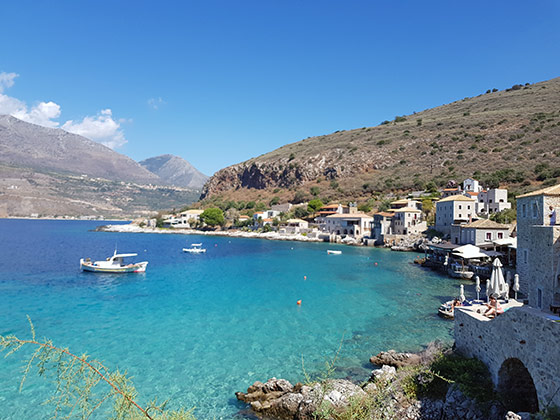
The seaside village of Limeni, Mani, Peloponnese, Greece
DAY 8
Saturday, October 10
MISTRA / OLYMPIA
Leave the hotel in the morning for Olympia, driving through the pretty country of Laconia and Arcadia. Olympia’s beautiful setting in a river valley covered with evergreen oaks, poplars, planes and pines, coupled with its importance throughout antiquity, make it one of the most significant archaeological sites in Greece. A sacred precinct dedicated to Zeus, it was at Olympia that the Panhellenic games were held every four years from 776 BC to 393 AD, giving rise to the modern Olympics. Explore Olympia, seeing its temples, other public buildings and the stadium where the games were held. Also, visit the Archaeological Museum, which exhibits some of the best Classical and Roman sculptures in Greece. Hotel Olympion Asty. Meals: B, L, D
DAY 9
Sunday, October 11
OLYMPIA / PATRA / FERRY CROSSING TO ITALY
Spend the morning at leisure in Olympia. After lunch, drive to the port city in Patra to board the ferry for the overnight passage to Barri, in Italy’s Puglia region. Accommodations in outside cabins with private facilities.
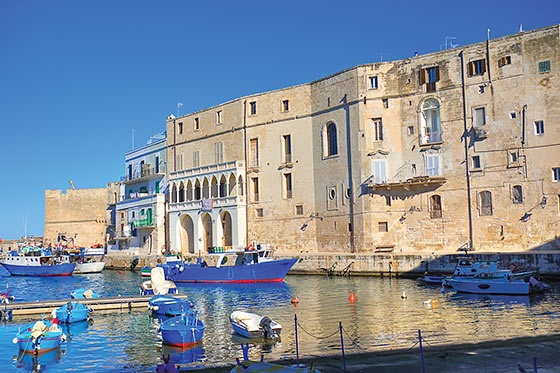
Monopoli, Puglia, Italy
DAY 10
Monday, October 12
BARI / MONOPOLI, Puglia, Italy
Dock in the morning in Bari, the ancient Barium, settled by Greeks and an important port and commercial center under the Romans. Disembark and drive to the fishing port town of Monopoli, noted for its 12th-century cathedral, rebuilt during the Baroque period (18th century). Following a lunch of seafood and other local specialties, continue to our lovely boutique hotel, Il Melograno. The balance of the day is at leisure with dinner included this evening. Meals: L, D
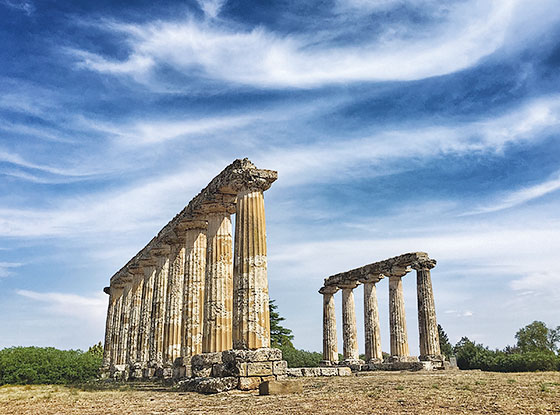
Tavole Palatine, Metapontum, Puglia, Italy
DAY 11
Tuesday, October 13
METAPONTUM & TARANTO
Although Mycenaean Greeks had a presence in southern Italy during the second millennium BC, it was shortly after 800 BC that Greeks began to settle in Italy’s southern shores. The cities they founded, (twenty two major settlements were established), grew in wealth and stature, becoming important centers of culture and learning. This part of Italy was known as Magna Graecia, “Greater Greece.” Leave the hotel in the morning to explore Metapontum, founded in the 7th century BC by settlers from Pylos in the western Peloponnese. The Doric temple known as the Tavole Palatine is one of the best preserved monuments of Magna Graecia. Continue to Taranto, the ancient Taras. Founded by Spartans in 708 BC, Taras became one of the most powerful cities of Magna Graecia. Today, Taranto is an important commercial port city. Tour the town, including the National Archaeological Museum, which houses one of the largest collections of antiquities in Italy. Meals: B, L
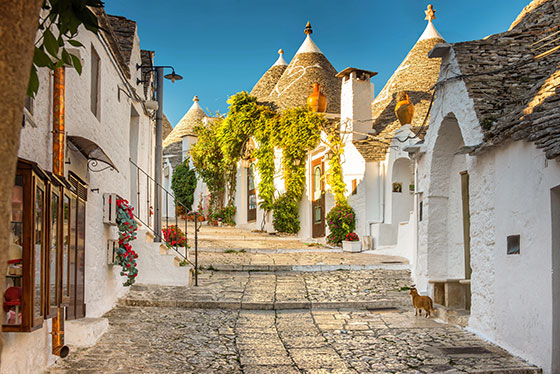
The trulli of Alberobello, Puglia, Italy
DAY 12
Wednesday, October 14
ALBEROBELLO / EGNATHIA
We begin the day exploring the town of Alberobello, a UNESCO World Heritage Site that features over 1,500 trulli structures. These remarkable, curious white-washed structures have pyramidal, conical or domed roofs built of corbelled local limestone without mortar, using a prehistoric building technique that has survived to this day. Lunch is at a traditional farmhouse that produces organic mozzarella, and other Apulian cheeses. We will be welcomed by the owner, Mariangela, who will show us how to make homemade mozzarella before we enjoy a meal of local specialties that she will prepare just for us. Continue to Egnathia, where we explore the remains of this Greek-Messapian town on the Adriatic Coast. In the evening, enjoy a farewell dinner. Meals: B, L, D
DAY 13
Thursday, October 15
BARI / USA
Transfer in the morning to Bari’s airport for the return flight to the USA. Meals: B
Program Inclusions
In Greece, two nights in Athens at the Hotel Grande Bretagne; two nights at the Hotel Ippoliti, Nafplion; two nights at the Mystras Palace Resort and Spa, Sparta; one night at the Olympion Asty Hotel, Olympia. In Italy, three nights at the Hotel Il Meligrano, Monopoli.
- Outside cabin with private facilities on the modern ferry from Patras to Bari.
- American breakfast each morning at the hotels.
- Seven lunches and seven dinners, with wine or beer.
- Lectures by Professor Jared Diamond.
- Transportation within Greece and Italy by air-conditioned Wi-Fi equipped motor coach.
- All tours and excursions as described in the itinerary with professional English speaking guides.
- Entrance fees to museums, archaeological and historic sites.
- Scheduled group airport/hotel transfer and handling of luggage on Oct. 4 in Athens and Oct. 15 in Monipoli/Bari.
- The services of an experienced Thalassa Journeys tour manager.
- Gratuities to guides, drivers and porters.
- All local taxes and service charges.
- Complete pre-departure material.
NOT INCLUDED: Airfare; travel insurance; expenses of a personal nature; any items not specified in the Itinerary or in the Program Inclusions.
Rates
$6,990 per person, double occupancy
Single room supplement fee: add $1,390
Tour costs are based upon current airfares, tariffs, and currency values. While we do everything possible to maintain the listed prices, they are subject to change. A deposit of $1,000 per person is required to reserve your space on the tour. Final payment is due 90 days prior to departure. Payment can be made by personal check or charged to a credit card. $699.00 of your tour fee will be a tax-deductible donation to the Skeptics Society — a 501(c) (3) nonprofit organization. Please download the brochure and the registration form for more information about cancellations, refunds, insurance, itinerary, and terms and conditions.
Invite a Friend
If you’d like to invite a friend to book this tour with you, please send them to skeptic.com/Greece2020 or download the full brochure and email it to your friend.
About Thalassa Journeys
Thalassa Journeys was established by the principals and managers of Travel Dynamics, the company that 50 years ago pioneered the concept of educational travel for America’s educational and cultural institutions. The belief that travel is primarily a learning experience forms the core principle of Thalassa Journeys. We bring an unrivaled depth of experience to make your journey with us meaningful, unique and seamless. We will take you not only to marvelous places, but we will also bridge the past with the present, illuminate the ancient sites we explore – what they were, how they came to be, and why they matter to us – make them come alive, and enrich your mind and inspire your senses. We are steeped in the culture of our destinations and know the secret places often overlooked by the guidebooks. We welcome you to the ever fascinating world of Thalassa Journeys.
Reservations & Questions
For reservations and information, please call Thalassa Journeys toll-free 866-633-3611, or download the registration form and email it to [email protected].
Colin Church
8815 Conroy-windermere Rd.
Suite 406
Orlando, FL, 32835
866-633-3611 (phone)
[email protected]
P.O. Box 338
Altadena, CA, 91001
626-794-3119 (phone)
626-794-1301 (fax)
[email protected]




